Annual UML Library Event Focuses on Improving Representation of AAPI Community
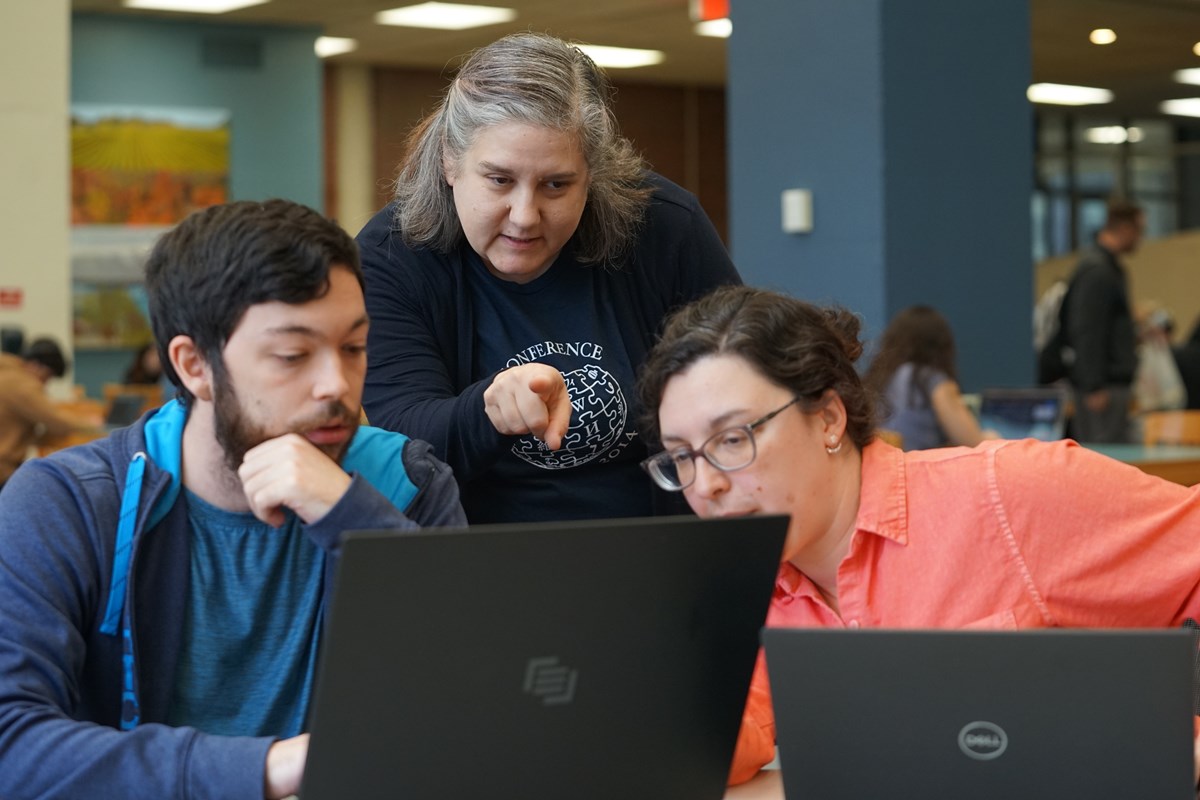 Image by Ed Brennen
Image by Ed Brennen
UML Library Asst. Director of Communications and User Experience Sara Marks, center, works with English major Neil Fahey and Asst. Prof. of History Jane Sancinito on a Wikipedia entry during the recent edit-a-thon at O'Leary Library.
05/10/2024
By Ed Brennen
At one table at O’Leary Library, senior economics major Cameron McLaughlin was trying to find more details about Lowell Mayor Sokhary Chau’s time at Macalester College in Minnesota.
At another table, first-year biomedical engineering major Rose Seely was researching state Rep. Vanna Howard, while senior English major Neil Fahey was doing the same for state Rep. Rady Mom.
The students weren’t doing the research for coursework, however. They were doing it to update the Lowell politicians’ Wikipedia pages.
The UML Library recently hosted its third annual Wikipedia Edit-a-thon, an event where community members come together to improve articles and create new entries on the free online encyclopedia that is used by more than 4 billion people worldwide.
Sara Marks, the library’s assistant director of communications and user experience, started the edit-a-thons at UML as a way for students to make a real-world impact with the skills they learn in the classroom.
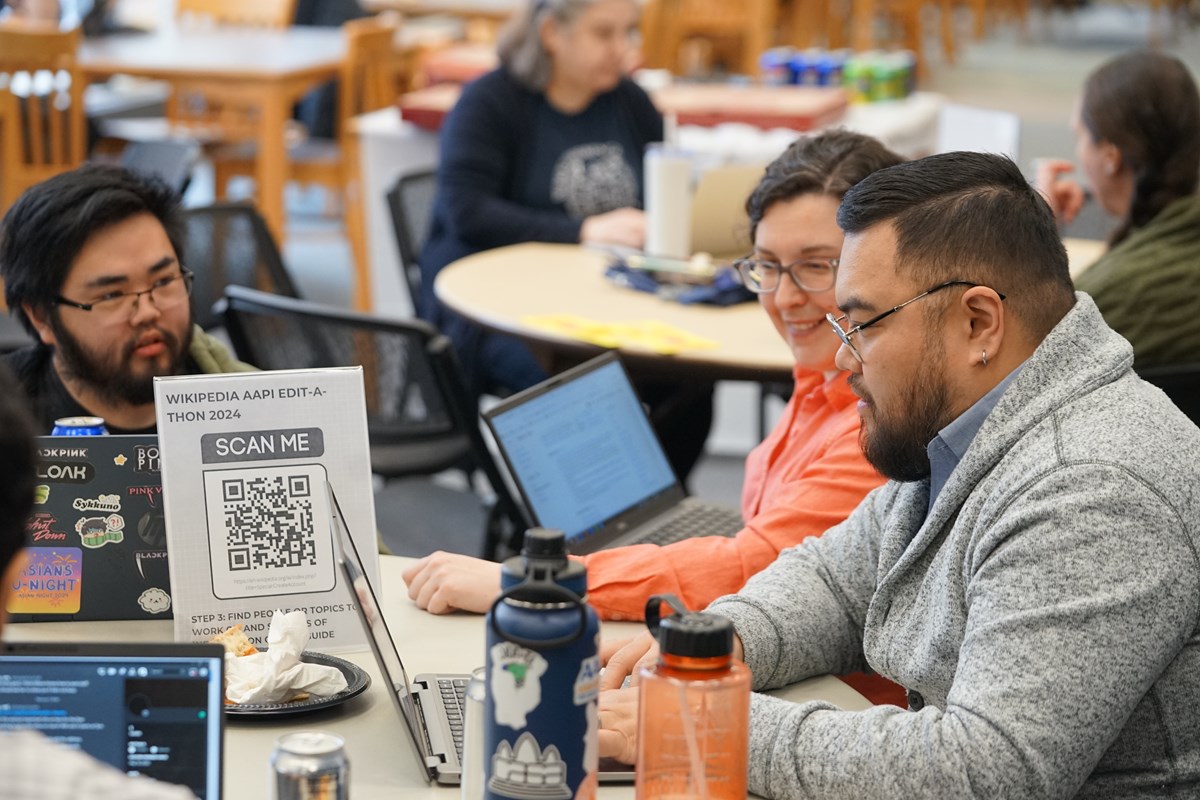 Image by Ed Brennen
Image by Ed Brennen
Asst. Prof. of History Jane Sancinito, center, helps AACEE Program Coordinator Joseph Banh, right, with a Wikipedia entry during the edit-a-thon at O'Leary Library.
“They use Wikipedia, but do they know how it works, how it becomes what it is and how they can expand on content themselves?” Marks asks.
Edit-a-thons usually have a theme, and this year’s UML event focused on raising the profiles of Asians, Pacific Islanders and Asian Americans. It was sponsored by the Center for Asian American Studies (CAAS), the Asian American Center for Excellence & Engagement (AACEE) and the Center for Women and Work.
“Asian American history is often overlooked when reviewing American history. This event is a great example of how we can work across campus to change that narrative,” says AACEE Program Director Cherry Lim, who along with CAAS Co-director Sue Kim and the Center for Lowell History compiled the names of 50 people and events that were either missing from Wikipedia or whose articles need updates.
Marks helped students create Wikipedia accounts so they could add sources to articles, make copy edits and include photos that are in the public domain. Marks tracked their activity on a dashboard.
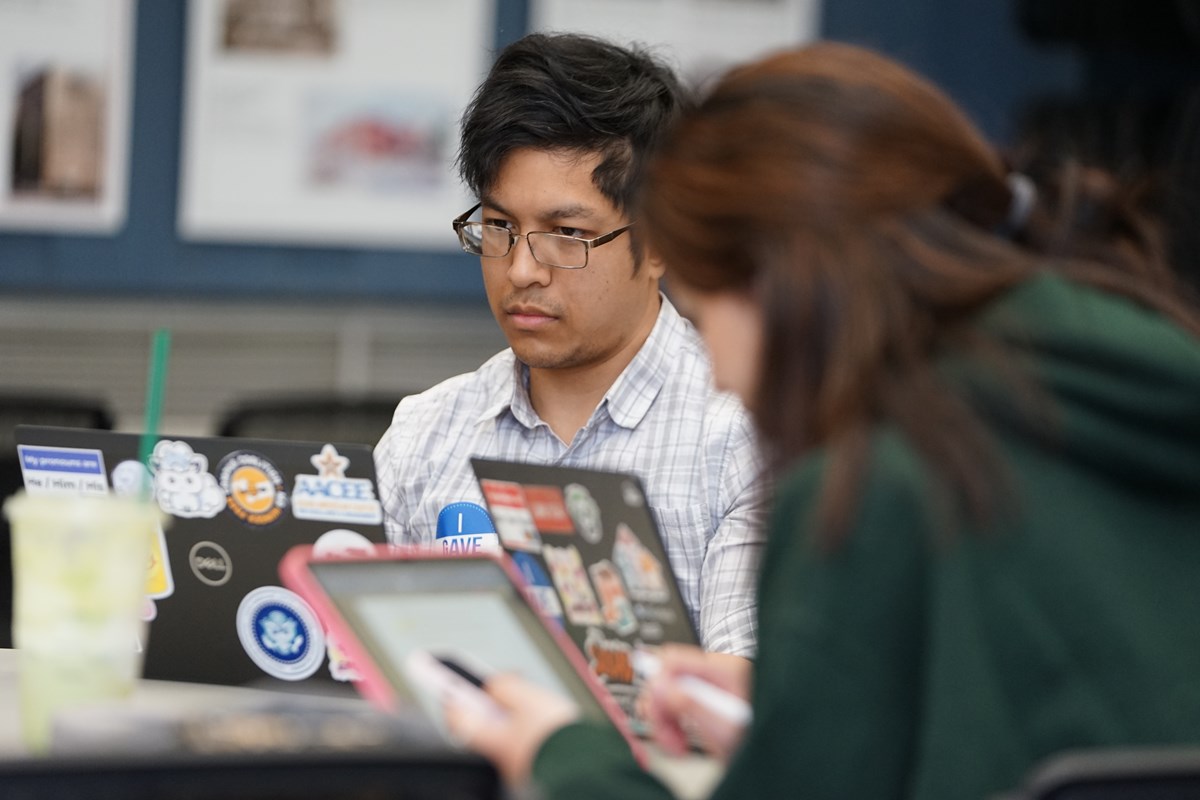 Image by Ed Brennen
Image by Ed Brennen
AACEE Program Coordinator Satyak Som helps build a Wikipedia entry for former UML Political Science Prof. Hai Pho and his wife, Lan.
Over the course of three hours at the O’Leary mezzanine, 13 student and faculty editors worked on 16 articles, making 95 edits and adding 60 references. They also created a Wikipedia page for Chancellor Julie Chen, using articles from the Boston Globe and Lowell Sun as sources.
“Julie Chen has done so many things that she gets a lot of coverage for,” says Marks, who notes that former chancellors Jacquie Moloney and Marty Meehan already had Wikipedia pages.
Within the first month, the articles from UML’s edit-a-thon had been viewed nearly 10,000 times by Wikipedia users around the world.
At last year’s edit-a-thon, which focused on art and feminism, 21 editors worked on 41 articles that have been viewed 258,000 times since, according to Marks.
Asst. Prof. of History Jane Sancinito offered extra credit for participating in the edit-a-thon to students in her Roman History and Civilization and Pirates of the Mediterranean courses.
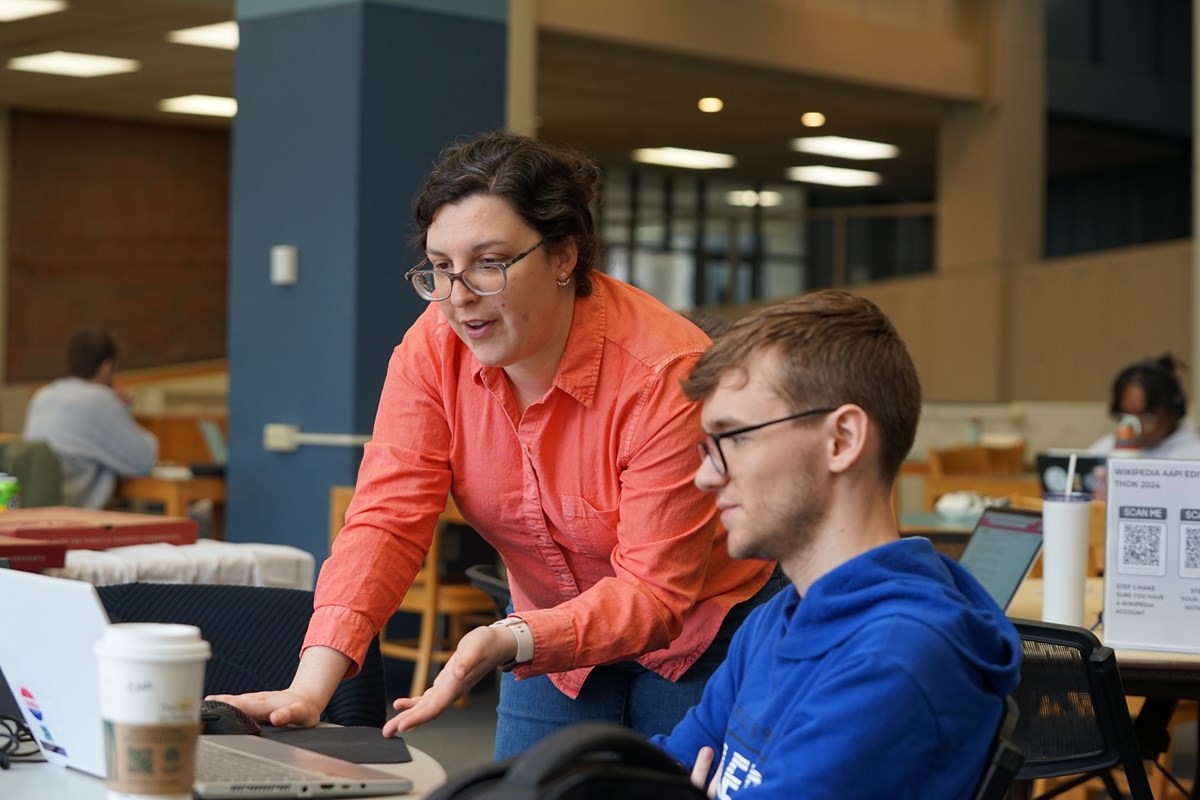 Image by Ed Brennen
Image by Ed Brennen
Economics major Cameron McLaughlin learns how to edit a Wikipedia entry from Jane Sancinito, an assistant professor of history.
“It empowers them to take control of a tool that they use pretty regularly,” says Sancinito, who participated in edit-a-thons at her two previous institutions, Oberlin College and the University of Pennsylvania.
Sancinito, who uses Wikipedia as “my first port of call” in her research, notes that a gender gap exists on the site: Less than 20% of articles are about women, she says, and women account for less than 5% of editors.
“It’s an opportunity to talk to students about how the people who write history manage to change the way history actually ends up being received later down the line,” she says.
And with generative artificial intelligence systems like ChatGPT scraping Wikipedia for copyright-free material to use as grist for their responses, Sancinito says it is more important than ever that the site be trustworthy.
“I would rather AI be scraping Wikipedia than someone’s conspiracy theory, but it means we have to make sure what we’re putting out there is reliable,” she says.
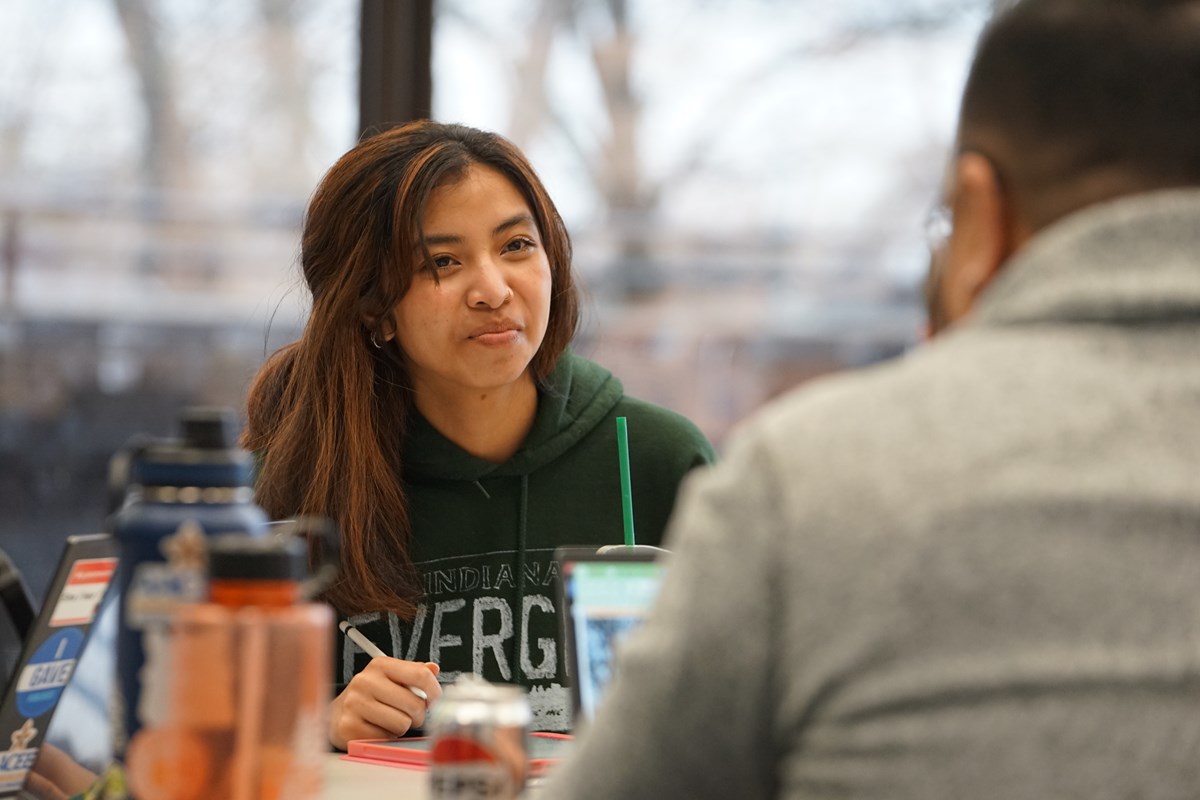 Image by Ed Brennen
Image by Ed Brennen
More than a dozen student and faculty editors worked on 16 Wikipedia articles at this year's edit-a-thon.
McLaughlin, who was researching Lowell’s mayor, is aware of the “negative connotations” around Wikipedia, which many teachers discourage students from using as a source of information. The Webster, Massachusetts, native says he tends to skip directly to the citations at the bottom of a page, where “you can find so many awesome sources.”
“I had no idea how people build a page, so it’s interesting to come here and make an account and see if I can do it. It’s more difficult than I thought,” he says while munching on free pizza provided by CAAS.
Seely, who heard about the edit-a-thon on the AACEE Discord channel, wasn’t familiar with Wikipedia but found the event useful.
“It was a good excuse to research Asian American people that I don’t know about personally,” says Seely, who is from West Newbury, Massachusetts.
Fahey, who updated Mom’s biography to reflect his 2018 election win, is an avid Wikipedia user. Now that he knows how to edit a page, “I’m going to have a hard time keeping my hands off this kind of stuff,” he says.
AACEE Program Coordinator Satyak Som worked on creating a page for Hai Pho, a former political science professor at UML, and his wife, Lan. They are co-founders of the Indochinese Refugee Foundation and had been on campus the previous week to be recognized for their work.
“There’s an article about everything on Wikipedia, but then seeing these people who are an important part of our community — locally famous but not famous enough to be on Wikipedia — it’s nice to give them their flowers and recognition they deserve,” he says.
